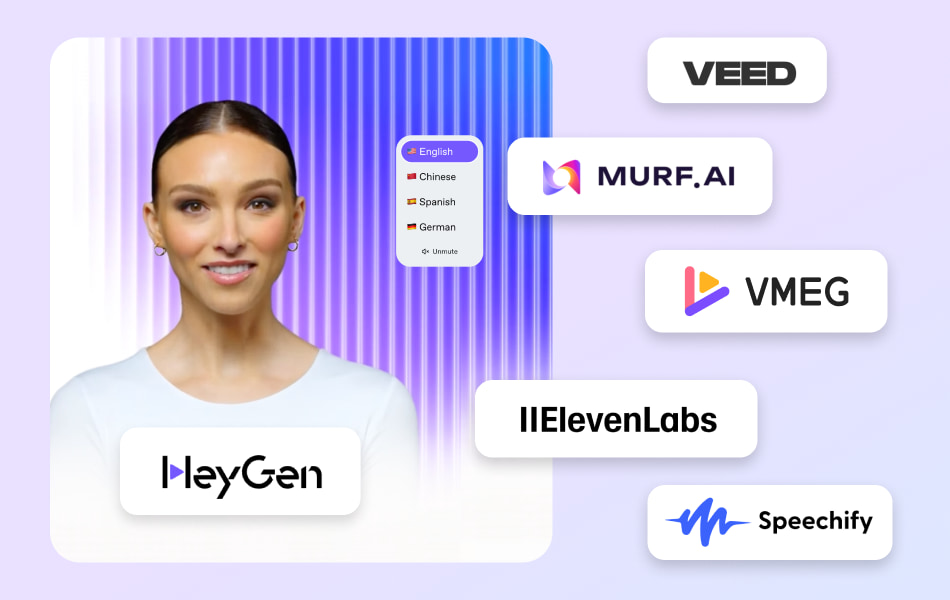
In today’s fast-moving digital content landscape, video translation and text-to-speech (TTS) technologies have become essential tools for reaching diverse, global audiences.
Whether you're a marketer, educator, or content creator, these solutions make it easier than ever to localize content, improve accessibility, and scale distribution across multiple languages.
Whether you're a marketer, educator, or content creator, these solutions make it easier than ever to localize content, improve accessibility, and scale distribution across multiple languages.
The global video translation market is expected to reach $2.5 billion by 2025, with an 18% compound annual growth rate through 2033.
This surge is being driven by the globalization of business, the rise of streaming platforms, and the rapid development of AI-powered workflows.
What is Heygen?
Heygen is a highly acclaimed AI video generation platform that has gained significant attention in recent years. AI avatars as its selling point, it is widely used in corporate promotions, educational videos, short video content production, and marketing advertisements.
In addition, Heygen also provides a series of video-related auxiliary tools, such as Avatars, Video Translator, Text to Video, AI Dubbing, Image to Video, etc., further enriching its platform function ecosystem. These features can meet basic needs in some light application scenarios and are suitable for user groups with low content quality requirements and low production frequency.
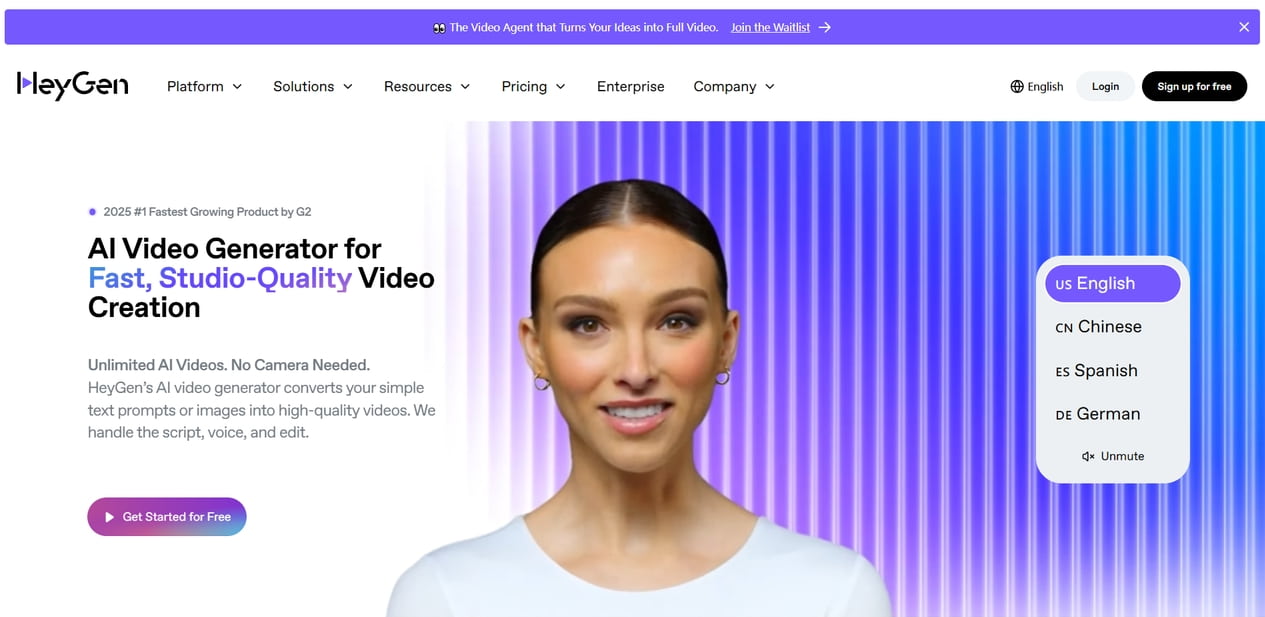
Why Look for Heygen Alternatives?
Video translation and dubbing are not Heygen's main features. In actual use, they often face issues such as audio-video desynchronization, inaccurate language recognition, unnatural translation quality, and voiceovers that sound robotic.
Additionally, certain aspects of Heygen's pricing strategy have sparked controversy among users. Multiple subscription plans listed on its official website's Pricing page prominently emphasize the phrase “Unlimited videos,” which can easily mislead users into believing that they can generate unlimited video translation tasks without any restrictions after subscribing.
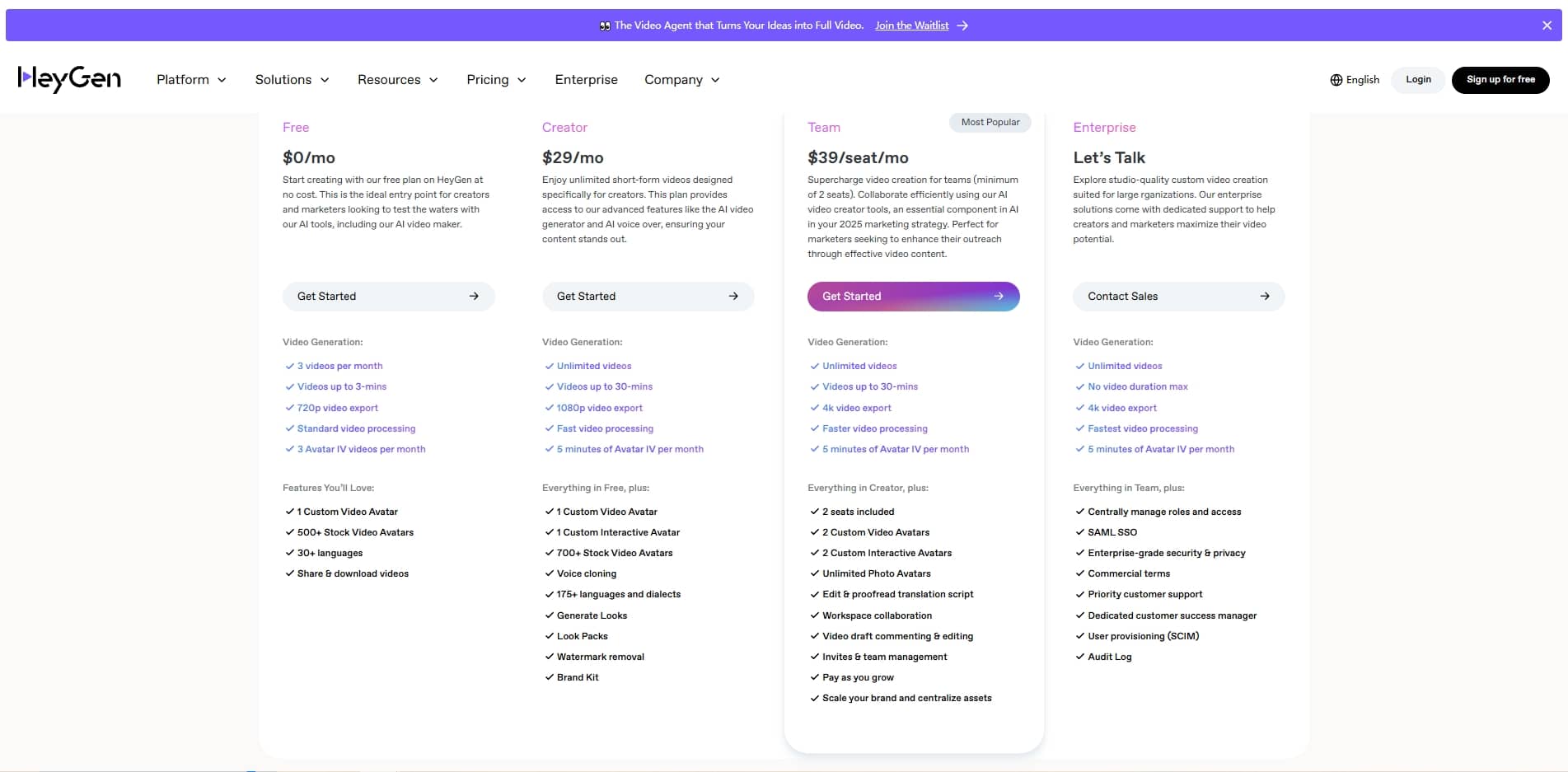
However, this is not true. Many subscribers have complained that 'Heygen is cheating' — they purchased the so-called unlimited plan, only for Heygen to revoke it without any warning or notification.
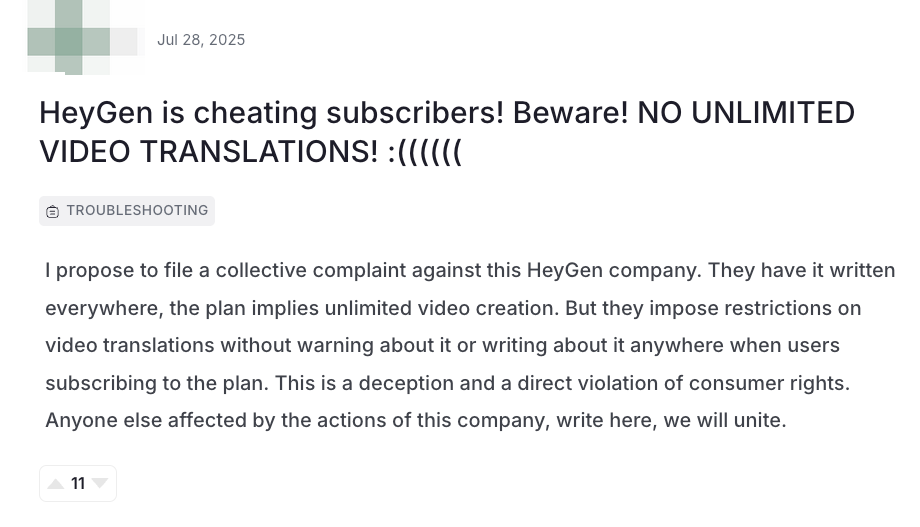
According to an official notice from Heygen customer support, a 120-minute limit has recently been added to the plan. In fact, the plan includes several usage restrictions, such as monthly video duration limits, point consumption rules, and limitations on the resolution of exportable videos.
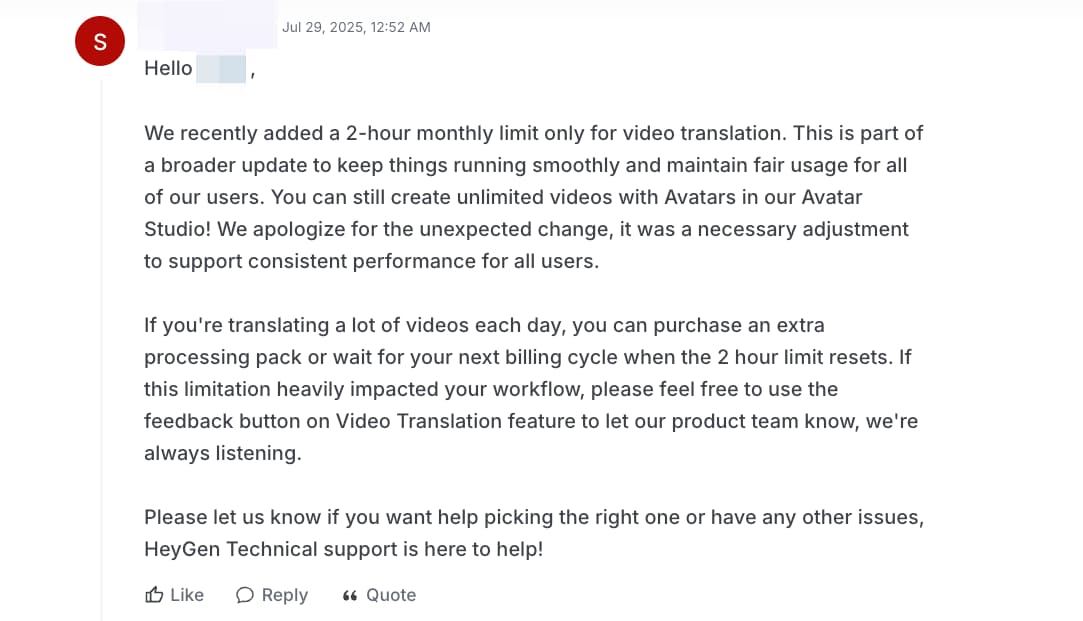
Once you reach the 120-minute monthly video translation limit, you'll need to purchase an additional pack with the starting price of $15. However, this rule is unclear and not clearly disclosed on the pricing page.
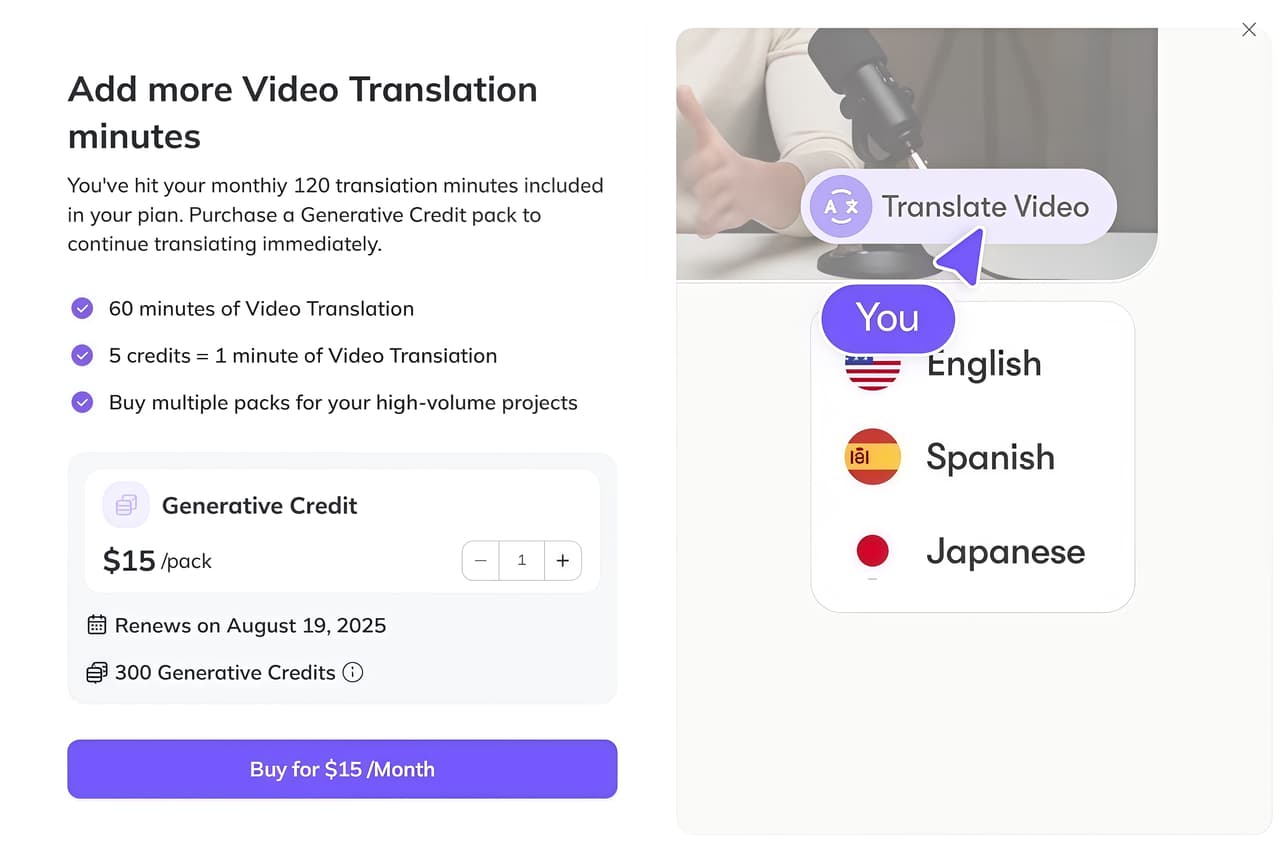
The “unlimited” appears to be more of a marketing term that can be misleading. Many users discovered after purchasing that their actual usage was subject to numerous restrictions, leading them to post complaints on community forums and platforms like Reddit, sparking significant discussion.
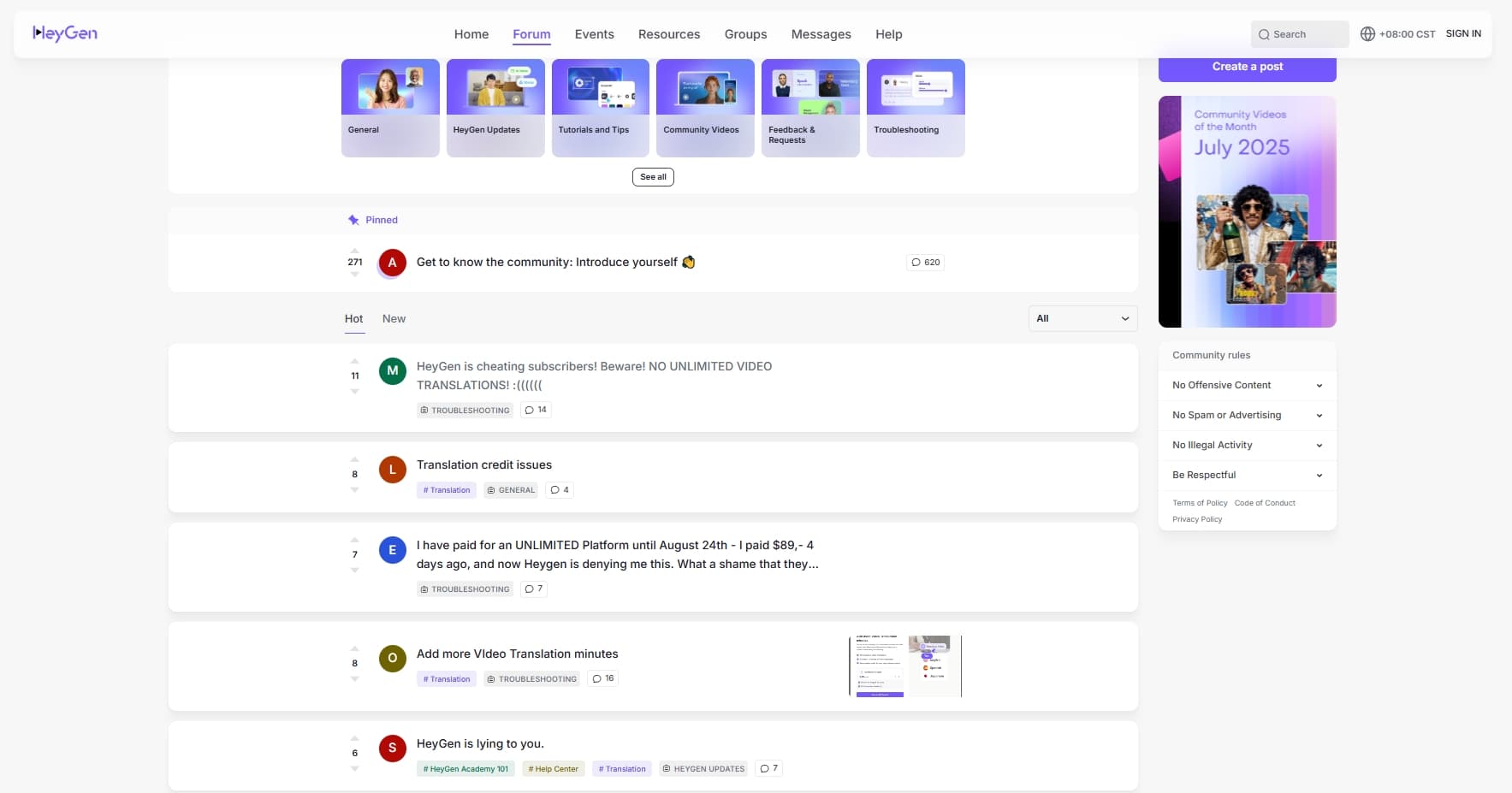
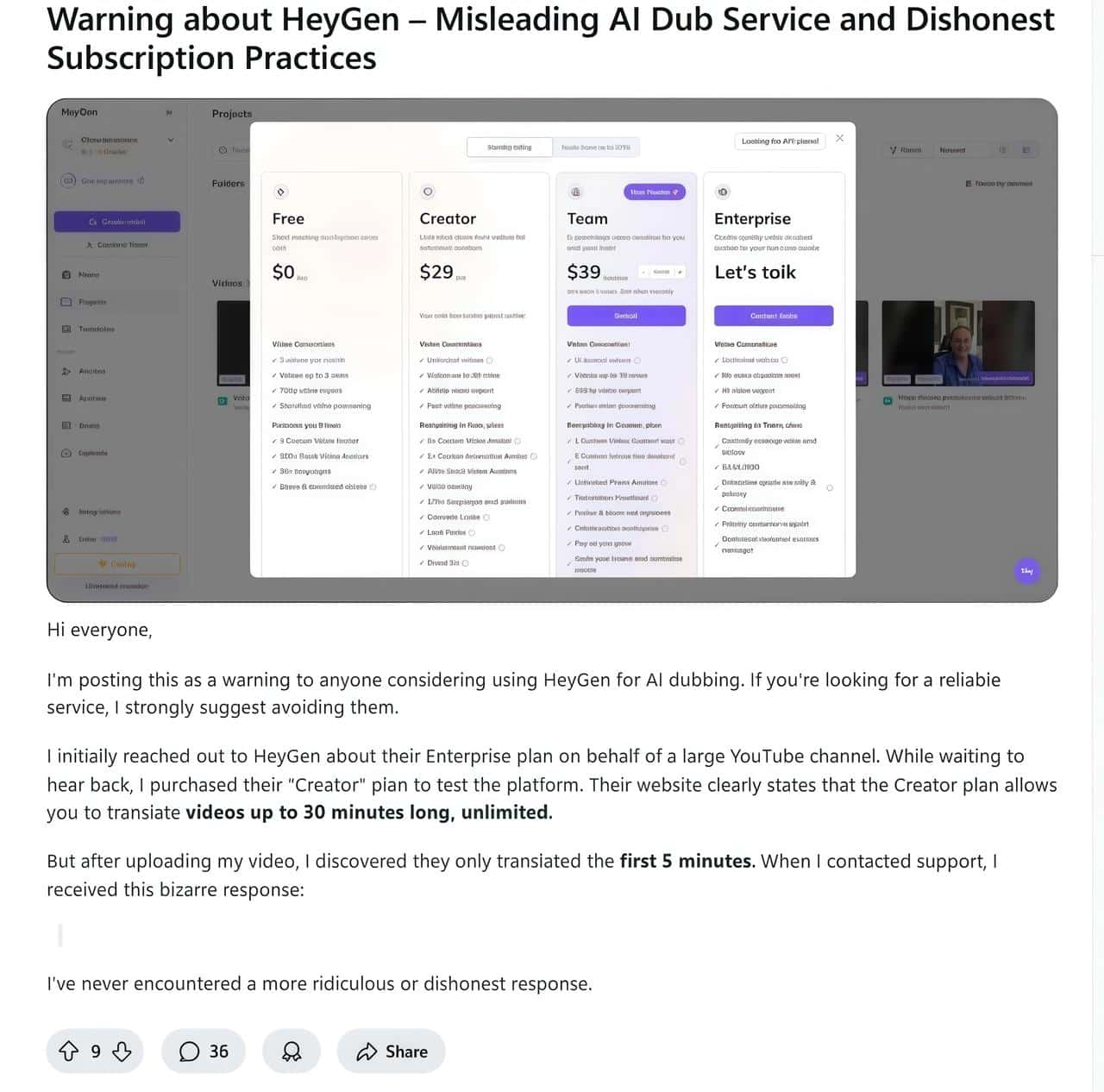
After several hours of testing, we evaluated five Heygen alternatives that are more professional and reasonably priced in today’s mainstream AI video translation and TTS market. Our goal is to help users find tools that better suit real-world use cases by providing practical, reference-worthy solutions.
Comparing the 5 Best HeyGen Alternatives
| Tool | TTS Voice Quality | Video Translation | Voice Cloning | Pricing(Most Popular) |
| Heygen | High | ✅ | 32 Languages | $39 / seat / mo |
| VMEG.AI | High | ✅ | 170+ Languages | $25/ mo |
| ElevenLabs | Very High | ✅ | 32 Languages | $11 / mo |
| VEED | Moderate | ✅ | 29 Languages | $29 / mo |
| Murf AI | High | ✅ | 33 Languages | $29 / mo |
| Speechify | High | ✅ | 30 Languages | $69 / mo |
5 Best HeyGen Alternatives Tools
VMEG AI – A Comprehensive Tool for Video Translation and Voiceover
VMEG is an AI-Powered video localization Platform, making your videos accessible to worldwide audiences by breaking language barriers.
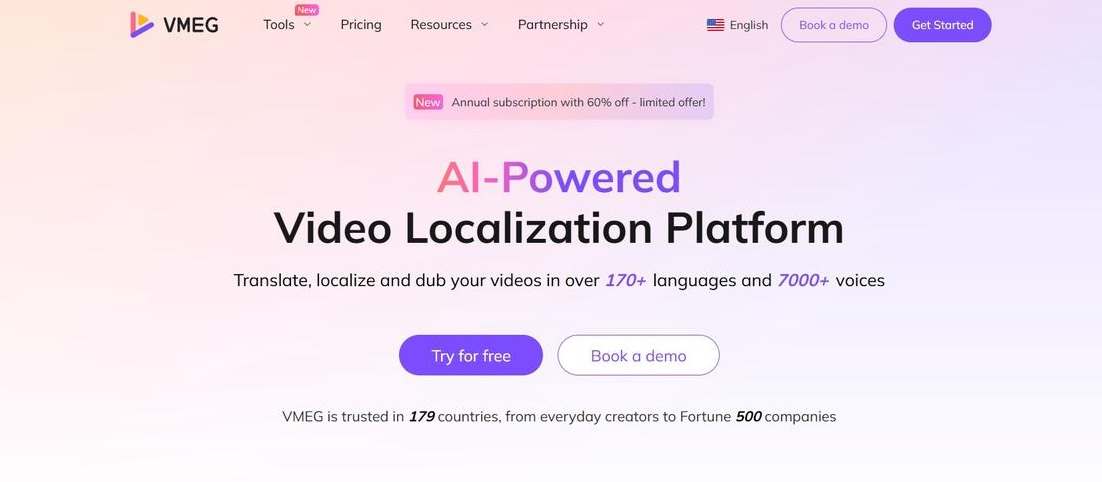
Pros
- All-in-one platform: video translation, dubbing, text to speech, subtitle generation, transcription.
- Full voice cloning support for all 170+ languages. The first and currently only platform to offer this.
- Language-specific optimized models ensuring the highest accuracy for each language and variant.
- Responsive and reliable customer support.
- Streamlined interface and fast processing with good balance of speed and quality.
- Clear and reliable pricing description.
Cons
- Limited advanced dubbing options
Best for: YouTubers, educators, filmmakers, and digital marketers often need to quickly localize and repurpose videos for multilingual audiences.
VMEG AI
Translate and dub videos into 170+ languages using 7,000+ natural-sounding voices, voice cloning, and accurate technology.
ElevenLabs – Known for Lifelike AI Voices
ElevenLabs has become a notable solution for those who prioritize voice naturalness in TTS applications.

Pros
- Produces natural, emotionally nuanced AI voices
- Ideal for narration, audiobooks, and podcasts
- An all-in-one platform
Cons
- Limited access to dubbing languages (currently supports 32 languages)
Best for: Podcast creators, e-learning platforms, and audiobook publishers focused on realistic voiceovers.
VEED – A User-Friendly Platform with Built-in Translation Features
VEED offers a browser-based video editor with integrated features for subtitles, translations, and text-to-speech.

Pros
- Browser-based video editor with subtitle and translation integration
- Auto-translate subtitles into multiple languages with ease
- Highly accessible video editing interface
Cons
- Voiceover options are more basic compared to dedicated TTS tools
- Less suitable for customers who only have translation & dubbing needs
Best for:
Beginners, social media managers, and creators focused on short-form videos with captions.
Murf AI – A Professional Choice for Voiceover and Narration
Murf provides advanced TTS services aimed at professionals in education, business, and media production.

Pros
- Wide variety of high-quality voices in multiple languages
- Controls for pitch, pace, and emphasis in voiceovers
- Real-time voice previews for precise editing
Cons
- Focuses mainly on voiceover rather than full video localization
Best for:
Professionals produce training videos, product demos, or e-learning content requiring polished narration.
Speechify – Designed for Listening and Multilingual Narration
Speechify is a text-to-speech (TTS) tool designed to convert written text into natural-sounding audio.

Pros
- Supports multiple languages and accents
- Ability to read documents, articles, PDFs, emails, and web pages aloud
- Tools to help with focus, comprehension, and note-taking
Cons
- Not designed for video translation or editing
- Limited direct video production features
Best for:
Students, professionals with reading challenges, and anyone needing multilingual TTS for content consumption or review.
Choosing the Right One for Your Workflow
As AI-driven tools for video translation continue to evolve, creators have more options than ever to produce localized and accessible content.
While Heygen offers a convenient all-in-one solution, exploring alternatives can help you find platforms that better align with your specific needs, whether that means higher voice quality, specific needs for specific languages, greater context accuracy, or more flexible editing features.
The five alternatives discussed here each bring unique strengths to the table. By selecting the right mix of tools for your workflow, you can improve efficiency, enhance audience engagement, and reach multilingual viewers more effectively.
Ultimately, the best choice depends on your goals, budget, and the type of content you produce. I encourage you to try these platforms and discover which ones work best for your projects.
Final Thoughts
As a well-known brand in the field of video generation, Heygen has indeed played a positive role in promoting the popularization of AI technology.
However, the more influential a platform is in the industry, the more responsibility it has to maintain transparency and honesty in its pricing strategies and feature presentations.
The current misunderstanding among users regarding the term “Unlimited videos” precisely reflects the ambiguity in the platform's marketing messaging. This ambiguity may erode user trust and impact the brand's long-term reputation.
For users, clearly understanding what they are purchasing, how many resources they can use, and whether it meets their actual needs are the most basic criteria for selecting an AI tool. This is precisely why many content creators are beginning to seek alternatives to Heygen.
If you are looking for a video translation or dubbing platform with more focused features, reasonable pricing, and transparent user experience, the 5 Heygen alternatives listed in this article may offer more suitable options for you.
AI Video Translator
Translate and dub videos into 170+ languages using 7,000+ natural-sounding voices, voice cloning, and accurate technology.